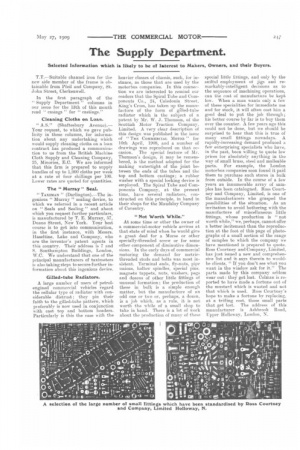The Supply Department.
Page 19

If you've noticed an error in this article please click here to report it so we can fix it.
Selected Information which is likely to be of 'Merest to Makers, Owners, and their I3uyers.
T.T.—Suitable channel iron for the new side member of the frame is obtainable from Pfeil and Company, St. John Street, Clerkenwell.
In the first paragraph of the " Supply Department " columns in our issue for the 13th of this month read " casings " for " castings."
Cleaning Cloths on Loan.
"AS.' (Shaftesbury Avenue).— Your request, to which we gave publicity in these columns, for information about any undertaking which would supply cleaning cloths on a loan contract has produced a communication to us from the British Machine Cloth Supply and Cleaning Company, 25, Minories, E.C. We are informed that this firm is prepared to supply bundles of up to 1,000 cloths per week at a rate of four shillings per 100. Lower rates are quoted for quantities.
The " Murray " Seal.
" TAXIMAN " (Darlington).—The ingenious " Murray " sealing device, to which we referred in a recent article on "Seals and Sealing' and about which you request further particulars, is manufactured by T. E. Murray, 57, Duane Street, New York. Your best course is to get into communication, in the first instance, with Messrs. Haseltine, Lake and Company, who are the inventor's patent agents in this country. Their address is 7 and S. Southampton Buildings, London, W.C. We understand that one of the principal manufacturers of taximeters is also taking steps to secure further information about this ingenious device.
Gilled-tube Radiators.
A large number of users of petrolengined commercial vehicles regard the cellular type of radiator with considerable distrust ; they pin their faith to the gilled-tube pattern, which pi eferably is now used in conjunction with cast top and bottom headers. Particularly is this the ease with the heavier classes of chassis, such, for instance, as those that are used by the motorbus companies. In this coenection we are interested to remind our readers that the Spiral Tube and Components Co., 24, Caledonia Street, King's Cross, has taken up the manufacture of the form of gilled-tube radiator which is the subject of a patent by Mr. W. J. Thomson, of the Scottish Motor Traction Company, Limited. A very clear description of this design was published in the issue of " TIM COMMERCIAL MOTOR for 16th April, 1908, and a number of drawings was reproduced on that occasion. The special feature of Mr. Thomson's design, it may be remembered, is the method adopted for the making watertight of the joint between the ends of the tubes and the top and bottom castings ; a rubber washer with a special locking device is employed. The Spiral Tube and Components Company, at the present time, have several radiators, constructed on this principle, in hand in their shops for the Maudslay Company of Coventry.
"Not Worth While."
At some time or other the owner of a commercial-motor vehicle arrives at that state of mind when he would give a great deal for a Morse or other specially-threaded screw or for some other component of diminutive dimensions. In the early days of commercial motoring the demand for metricthreaded studs and bolts was most insistent. Terminal ends, fly-nuts, pipe Unions, hollow spindles, special pins, magneto tappets, nuts, washers, pegs and dozens of other little fittings of unusual formation ; the production of these in bulk is a simple enough matter, but the manufacture of an odd one or two or, perhaps, a dozen, is a job which, as a rule, it is not worth the while of a small shop to take in band. There is a lot of work about the production of many of these
special little fittings, and only by the skilful employment of jigs and remarkably-intelligent decisions as to the sequence of machining operations, can the cost of manufacture be kept low. When a man wants only a few of these specialities for immediate use and for stock, it will often cost him a good deal to put the job through; his better course by far is to buy them over the counter. A few years ago this could not be done, but we should be surprised to hear that this is true of many small fittings nowadays. A rapidly-increasing demand produced a few enterprising specialists who have, in the past, been willing to quote low prices for absolutely anything in the way of small brass, steel and malleable parts. For example, the London motorbus companies soon found it paid them to purchase such stores in bulk from outside. In the course of a few years an innumerable array of samples has been catalogued. Ross Courtney and Company, Limited, is one of the manufacturers who grasped the possibilities of the situation. As an invitation to avoid bothering with the manufacture of miscellaneous little fittings, whose production is "not worth while," we, perhaps, cannot offer a better incitement than the reproduction at the foot of this page of photographs of a small section of the range of samples to which the company we have mentioned is prepared to quote. Ross Courtney and Company, Limited, has just issued a new and comprehensive list and it says therein to wouldbe clients, " If you don't see what you want in the window ask for it." The parts made by this company seldom wear out: they get lost. Colman is reported to have made a fortune out of the mustard which is wasted and not that which is used. Ross Courtney's hope to make a fortune by replacing, at a trifling cost, those small parts that get lost. The address of this manufacturer is Aahbrook Road, Upper Holloway, London, N.




















